George H.W. Bush, 41st president of the United States, gave the keynote speech at the College’s 163rd Commencement in 1998.
Bush received an honorary doctor of laws degree from Lafayette President Arthur J. Rothkopf ’55, who served as deputy secretary of the U.S. Department of Transportation in the Bush administration. The occasion marked Bush’s return to Lafayette after 50 years. He played baseball against Lafayette when he was captain of the Yale baseball team as a senior in 1948.
Bush’s speech:
Arthur [Lafayette President Arthur J. Rothkopf], thank you, sir, for that very generous introduction. To all the trustees, headed by Larry Ramer, for that magnificent citation and this honorary degree. I salute the faculty, the parents, and, most importantly, the Class of 1998.
And I’m reminded a little bit of the guy who was standing out in front of the Waldorf Hotel, and he saw a kid dragging a mongrel dog with a rope around his neck, going west. And he said, “Where are you going with that dog, kid?” And the kid said, “Well, I’m going to put him into the Westminster Kennel Club pet show.”
And he said, “Do you think he’s going to win anything?”
And the kid said, “No, but he’ll be in some damn fine company.”
And that reminds me of the fellow honorees here today, degree winners, and I am in fine company, and I appreciate the opportunity to speak on their behalf at this marvelous commencement.
I’m kind of sorry that Arthur, my old friend who served our country with great honor, mentioned the parachute jump. In many ways, it was a wonderful experience. Barbara had little doubts about it in the beginning. But after I fell 7,500 feet freefall and then floated 5,000 feet down to the ground, I landed with exuberance in the sands of Yuma, Arizona. And I said to my wonderful wife of 53 years, “What’d you think of that one?” And she said, “I haven’t seen a freefall like that since the 1992 election!”
As Larry pointed out, it was 50 years ago that I was last here on this beautiful campus for the Eastern Regional Baseball Playoffs. I was indeed playing first base for Yale. I struck out twice against Lafayette, and I hope that this is not the third time. And I also got caught trying to steal second base, and I also want to apologize for that. Modesty prevents me from telling which team won the regional series, but I think it speaks highly for Lafayette that you’re able to overlook those transgressions, and I’m sure glad you did because this is a special day.
Over the course of my 35 years in public life, I’ve been fortunate to be invited to take part in a number of different graduation ceremonies across our country, and I’ve noticed that there’s a common denominator, that one thing never changes. You can never tell who’s happier that this educational and enriching experience has come to a close, the students or the parents. And of course, as proud parents in our own right, we’ve been blessed to see our five kids graduate from college. And so, to the broke, but happy, parents here, let me say that Barbara and I feel your pain.
I was reminded of this parental role again two weeks ago as Barbara and I watched our oldest grandson, George P. Bush, graduate from Rice University in Houston. There were plenty of smiles—and some tears—and it struck me that perhaps more than any other day, there’s a certain something special about graduation. It struck me that days like today are when the past intersects with the future. And this is also a wonderful day for family when the generations come together. And I was thinking about all these different things as I sat there in the audience at Rice, listening to Kurt Vonnegut, the author, give a wonderful, magnificent graduation speech. And then another thought occurred to me. It occurred that as the graduation speaker this afternoon, I should remember to do unto others as I would have them do unto me. And so I promise to be brief, because I remember the story of the kid that went to church with his grandfather, and he said, “Grandfather, what are all these flags along the sides of the chapel here?” And the grandfather said, “Son, that’s for those who died in service.” And the kid said, “Really? The nine o’clock or the eleven o’clock service?”
So, I would simply make a few serious remarks.
This year marks a half-century since I graduated from school, and it’s funny—I’m 74 almost, next week I guess it is—I can’t remember where I had lunch yesterday, but I remember something from way back then, and I remember it distinctly.
We had our reunions—our last baseball game was kind of a reunion day. And the last game of my college career was played at Yale Field during reunion weekend. And for some reason, I’ll never forget the sight of the 50-year reunion class that came parading into the ballpark. There they were, a bunch of old guys, rejoicing in seeing old friends, glad to still be alive (and I think that most of them that marched in were alive). And surely Lafayette’s Class of 1898—think of that, 1898—was the same. And there was a lot of good will as the Class of 1898 marched in. And some still had a spring in their step, but back where I started they all looked old, and with good reason. Their generation had been through a lot.
As the Class of 1898—50 years ahead of me, a hundred years ahead of you—graduated from my school and from Lafayette, many signed up immediately to participate in the Spanish-American War. And they watched in awe as the Wright Brothers began flight and then, a little later, Henry Ford’s introduction of the new automobile.
Twenty years following their graduation, they agonized over a “war to end all wars,” World War I. They saw that war grind up their classmates—Lafayette lost 33 graduates who helped defeat Germany’s aggression. And 30 years removed from their graduation, they were seized and some literally destroyed by the Great Depression. And as the Class of 1898 celebrated their 40th anniversary, they saw Adolf Hitler unchecked, ready to race through the lowlands, and free nations fell beneath the Nazis’ boots while the U.S.A. and other nations sat on the sidelines. “No Americans to fight abroad!” was the cry.
And 45 years after they left college, they saw their sons and daughters fight in World War II, fight to end German fascism, and fight to end Japanese imperialism. But as they came together for their 50-year reunion, hopes had been lifted with the end of World War II and the founding in ’48 of the United Nations. And still, as the Class of 1898 began to fade from the scene, the dark shadows of the Cold War began to stretch across Europe. Before long it would envelop Asia, Africa, and Latin America, too.
And my class was, again, the Class of 1948, and most of us, here at Lafayette at that time, my school too, served in World War II, the country came together in a unity really not seen [until] the end of Desert Storm. We saw classmates die. Indeed 89 Lafayette grads gave their lives fighting for the cause of victory. And we watched as our nation, in victory, embraced our former enemies, lifted them up and helped them rebuild their countries and nurture their new democracies.
We saw TV begin. When I was a kid they didn’t have it. We had the Lone Ranger and programs like that. We watched TV begin really with stars like Ed Sullivan and Milton Berle and Lucy. Then along comes “60 Minutes” and magazine programs and “All in the Family.” But recently we’ve got Roseanne Barr and Jerry Springer. God save the United States of America. What a waste! What an intellectual waste! (Sorry you Springer fans out there.)
And we saw the Cold War intensify as Soviet tanks crushed the freedom fighters in Eastern Europe and that monstrous obscenity, the Berlin Wall, literally divide a country in half. My class saw the threat of nuclear war as two superpowers faced each other, and the Communists said, “We’re gonna bury you.” Do you remember Kruschev coming to the United Nations and pounding his shoe on the United Nations lectern? “We will bury you.” And our response was, “Freedom will prevail.”
And we witnessed two ghastly wars with unhappy endings, Korea and Vietnam. Lafayette lost three in Korea and 14 in Southeast Asia. And just as troubling, that latter conflict, Vietnam, divided us, ripped our country apart, like nothing since the Civil War. And we lived blanketed with fear over nuclear fallout, concerned with superpower conflict.
My predecessor, my dear friend Ronald Reagan, came into office, rightly concluded that only a strong America and a strong NATO could guarantee your freedom. And I became president in 1989, and in four short years, your class, this class of 1998—you were in junior high or in high school—saw perhaps the most monumental global changes compressed into any four-year period in our nation’s history. I believe your professors of political science and history would attest to that.
The Berlin Wall fell, and Germany, contrary to the predictions of most statesmen around the world, was unified, fast, and stayed in NATO. The Baltic States gained their independence, the Warsaw Pact collapsed, and the Soviet Empire—that great superpower that scared your parents to death—simply imploded, and Eastern Europe was totally liberated.
And with Gorbachev’s cooperation, I convened the Madrid Peace Conference, where Arabs and Jews talked peace to each other in one room—unthinkable, an unthinkable scenario for years. And, you know, that never would have happened without the patriotism and service of many sons and daughters of Lafayette in Desert Storm, without the 31 nations that came together to form a disparate coalition, and defeated a brutal aggressor on the sands of Kuwait.
And so as your class began to come of age, hopefully, you’ve seen that things are different now, that they are very different. But still you might ask, how does that past witnessed by the classes of 1898 and 1948 intersect with your future? Well, consider this: In my view the Soviet Union will never go back together again, Eastern Europe is going to remain free, and, in spite of India’s dreadful and unfortunate action just recently, the world no longer has to worry, in my view, about nuclear Armageddon.
And sure, plenty of dangers remain. And today our enemies—people say to me, “Well if it’s all over, why do we need a defense, why do we need a strong intelligence, who’s the enemy?”—but there are plenty of enemies. They are international terror; they are Islamic fundamentalism, the spread of weapons of mass destruction—chemical, biological weapons; there’s narco-traffickers. All these and more explain why the United States of America must stay involved in the world and why we must stay strong and why we must lead.
Today there’s a strange coalition in Washington and some other places across this country, consisting of people on the political right and the political left, coming together in a strange way. Big labor and some of the liberals in the—in my opposition party, the liberal Democrats joining with some Republicans on the far right in calling for America to come home. “We’ve done our part, it’s time for others to do the heavy lifting of international leadership.” In my view, we must not listen to that siren’s call. We must not neglect the rest of the world.
We must not neglect Asia. We must tend to the most important bilateral relationship on the face of the earth, the one that could adversely affect peace for you in the next millennium or could guarantee your prosperity, and I’m talking about the U.S.-China relationship. And we know it the way dissident Huang—do you remember that hero who stood in front of the tanks in Tiananmen Square in 1989, a hero, jailed for 10 years, comes to this country and he says, “Don’t bash China. Stay involved with China. Don’t cut off trade with China.” And so we must stand on our principles, but we must resist the temptation to berate and demean the Chinese people. Of course, we’ve got to stand up for our principles on human rights and individual liberties. But we’ve got to treat others, countries large like that or countries small, all of whom respect their sovereignty, with a certain respect.
The point is, as we move into the next millennium, your class has a shot at a world that is much more peaceful, much more prosperous, much freer and more democratic than what my class saw or what my predecessors of 100 years ago saw. And to be sure, our society is going to have ills to battle. My heavens, you know them all—you’re trying to do work in the communities here, I hope: teen pregnancy, drugs, broken homes, gang violence, illiteracy, filthy entertainment, racial prejudice still in this great country.
The world you enter today is far from perfect, but you’re ready because here you have been blessed. Great professors have given you a great education. You’ve been blessed to forge friendships that are going to last a lifetime, until your 50th reunion, and beyond.
And most of all, you’ve been blessed by the abiding love of family, the abiding love of parents to guide you. And you’ve been blessed by the values they have taught you which will sustain you through success and, of course, through hard times alike.
You’ve been given all this and more, so what are you going to do with your life? Will you constantly sit on the sidelines and, excuse the word, bitch about life? Are you going to complain all the time when things go wrong? Will you be selfish and say, “Why me?” or “If it feels good, let’s do it?”
Or will you roll up your sleeves and get involved and give something back? Will you strive to lift someone up and help others, all the while giving credit to someone else? Are you going to simply say, “Politics is lousy,” as you sit whining on the sidelines, or are you going to serve society, and in some way, serve your country?
I have a wonderful feeling, having done a little homework about this class, that you will appreciate what you’ve been given at this great university, and you are going to charge out of here setting goals and achieving great ends. And in your own way, I hope you will find a way to be what I called when I was President “one of a thousand points of light.” Because your nation needs you and because there can be no definition of a successful life that does not include service to others.
So remember, a lot of people are counting on you. May God bless you. And I’ll close with my favorite story, given by our family friend Billy Graham, who comes to our house and talks to our grandkids about the complications of life today. He told of a guy standing up here giving a speech where I am who went on a little too long. A man over here picked up his shoe, took it off, heaved it. Missed the speaker and hit a lady in the front row, who said, “Hit me again, I can still hear him.”
Thank you very, very much.
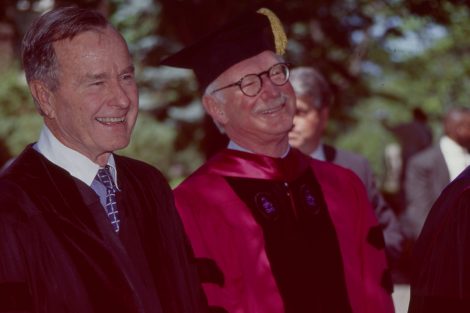
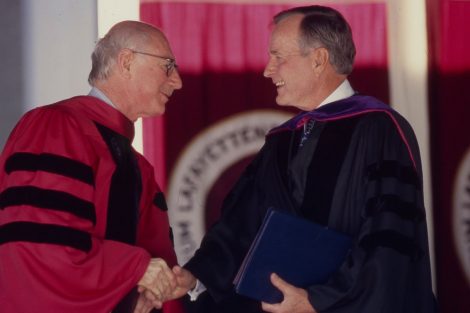
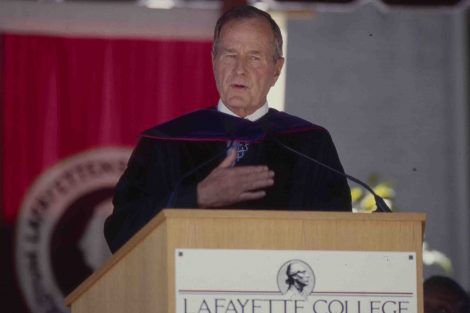
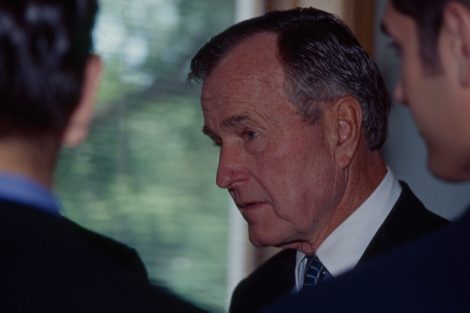
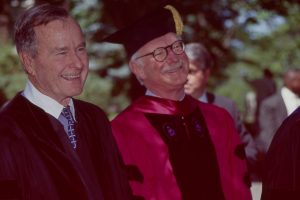
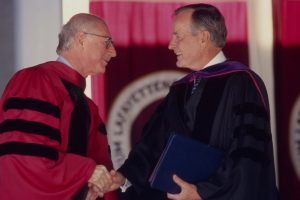
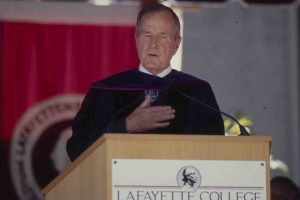
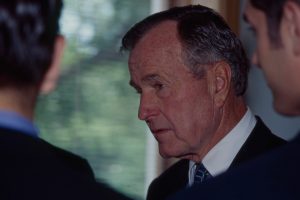
1 Comment
It was a great speech. The predictions in the President’s speech are what is happening today
Comments are closed.